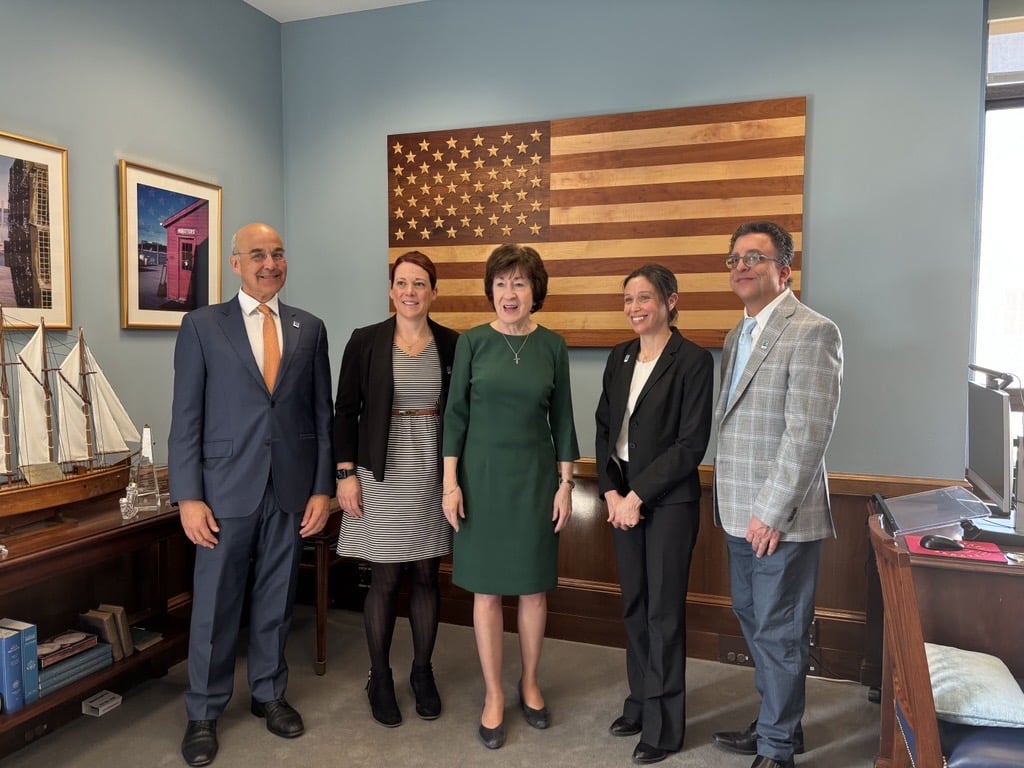Endocrine Society Advocates to Protect Funding for NIH and Reauthorize SDP on Capitol Hill
On Wednesday, March 12, the Endocrine Society hosted a Researcher Hill Day and brought members from across the country to Washington, D.C., to meet with their senators and representatives and discuss the importance of completing the appropriations process for Fiscal Year 2025, protecting the National Institutes of Health (NIH) from further cuts in 2025, reauthorizing the Special Diabetes Program (SDP), and providing at least $51.303 billion for NIH in Fiscal Year 2026. Together, we met with over 35 key congressional offices across 13 states and D.C. to share these important messages. Our message was further amplified by 150 members who wrote to their delegations using our online campaign.
The Researcher Hill Day was especially strategically timed because funding for the federal government was set to expire on Friday, March 14 and if Congress had not acted, the government would have shut down. On Tuesday, March 11, the House of Representatives passed a Continuing Resolution (CR) that would fund the government at current levels through the end of the fiscal year, September 30. The Senate passed the bill that Friday, averting the shutdown just hours before the midnight deadline. The CR also contained an extension of the Special Diabetes Program at current funding levels through the end of the fiscal year.
During our meetings in congressional offices, we shared examples of the impact cuts have on research and how funding for grants has still not been released. We also shared that Council meetings still have not been scheduled, making it impossible for new grants to be approved. We urged representatives and senators to make inquiries. On March 13, the NIH responded to pressure and announced it will begin scheduling Council meetings for May. All congressional offices encouraged us to continue to share examples of research in jeopardy. If you have a story about how cuts would affect your research, please contact: [email protected].

Society Continues to Advocate for Medicare Physician Payment Fix, SDP, Telehealth
On March 14, Congress passed a stopgap spending bill to fund the government through September 30, 2025.
This legislation also included a short-term extension of the Special Diabetes Program (SDP) and extension of the Medicare telehealth waivers through September 30. The Society has been a leading voice in advocating for these priorities. We have urged Congress to reauthorize SDP at $200 million per-program per-year for at least two years. SDP is comprised of two components. The Special Diabetes Program for Type 1 advances research for type 1 diabetes. The Special Diabetes Program for Indians (SDPI) provides treatment and education programs for people with type 2 diabetes among American Indians and Alaskan Natives (AI/AN). We have also urged Congress to permanently extend the Medicare telehealth flexibilities which would ensure expanded access to care via telehealth for all Medicare beneficiaries. We will continue to urge Congress to address these priorities in the coming months.
Unfortunately, the legislation did not address the 2.83% Medicare physician payment cut that went into effect on January 1, 2025. Prior to the vote on the spending package, we advocated for Congress to include language in the legislation to rescind this physician payment cut. Congressional leaders have pledged to address the cut this year, but the path forward remains unclear at this time. We will continue to advocate for Congress to rescind this cut and provide an inflationary update to the Medicare Physician Fee Schedule.
Endocrine Society Calls for Restoration of Diabetes Prevention Program
As this issue of Endocrine News went to press, the Trump administration cancelled all National Institutes of Health (NIH) funding for the Diabetes Prevention Program (DPP). The Society is calling for restoration of this funding and noted that eliminating funding for the Diabetes Prevention Program contradicts the administration’s commitment to addressing chronic disease and making America healthy.
The Society is concerned about the loss of this ongoing research, which is conducted at 30 institutions in 21 states and will impact tens of millions of people who have type 2 diabetes and prediabetes, the investigators, and the clinical personnel who work on this program.
DPP, which started in 1996, found that lifestyle changes or taking the medication Metformin could prevent or delay the onset of type 2 diabetes in people at risk of developing the condition and demonstrated that a 5% – 7% weight loss lowered the risk of developing diabetes by 58%.
The DPP Outcomes Study is the long-term follow-up study of the DPP cohort and is currently studying Alzheimer’s disease and dementia, in addition to continuing to study the long-term effects of diabetes prevention on other health conditions such as cancer, heart disease and stroke, nerve damage, kidney disease, and eye disease. It has continued to follow many of the more than 3,100 surviving DPP participants since 2002.
The research provides an important source of long-term information on diabetes prevention. According to the U.S. Centers for Disease Control and Prevention (CDC), 38.4 million people in the U.S. have diabetes. That is 11.6% of the population. Another estimated 97.6 million U.S. adults had prediabetes as of 2021.
Preventing and delaying the onset of diabetes can help reduce other chronic conditions, such as heart and kidney disease, and control health costs. The direct and indirect costs of treating diagnosed cases of diabetes nationwide total an estimated $13 billion in 2022, according to the CDC.
For more information, please visit: www.endocrine.org/takeaction.
TAKE ACTION: The Endocrine Society advocates on a wide range of issues affecting our members from research funding cuts to diabetes prevention to access to care, and we encourage our members to take action as well. Please visit www.endocrine.org/advocacy to see our new advocacy toolkit to make taking action easy and effective. We have information about how you can join one of our online campaigns, call your congressperson, visit your congressional delegation in Washington, D.C., or at home, write a letter to the editor, and attend a Town Hall meeting.

